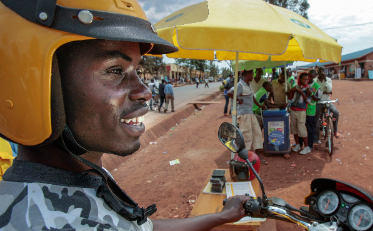Monitoring and evaluation: staying on target
24 Jan 2014
“I have been struck again and again by how important measurement is to improving the human condition.” –Bill Gates
As a target-driven organisation, we need to know the impact of our investments: what difference have we made to the lives of our clients and their families? In order to find out, we track key indicators across the entire Hand in Hand network. Each month we monitor outputs – people trained, businesses started, jobs created – as well as inputs, such as the number of active Self-Help Groups and amount of micro-credit extended and repaid.

Zacharie | MTN Product Distribution | Umucyo, Rwanda
Increasingly, however, traditional methods of monitoring and evaluation simply don’t cut it. As aid budgets tighten around the world, institutional donors – who make up just less than half of our funding – are rightly asking not just for results but for evidence that we are efficient and cost effective in the programmes they’ve paid for. That’s why we’ve engaged specialist consultant ITAD to help us develop an overall framework that will produce consistent, independently verified evidence of results and impact.
The story so far:
Previous assessments of Hand in Hand programmes have produced promising results. In October 2012, an independent analysis of Hand in Hand India’s job creation programme carried out by M-CRIL – a specialist microfinance consultancy used by the World Bank, the British and Swiss international development agencies and the Ford Foundation – found that:
- Jobs supported by Hand in Hand India are long-lasting: more than 97% are sustained three years on from Hand in Hand’s initial support.
- On average, each woman trained by Hand in Hand ultimately supports 1.65 jobs – employing not just herself but others in her family and community.
- Two out of the three jobs generated through the program are held by women. Nationally, Indian female labour participation is only 29%
Likewise, a December 2013 review of Hand in Hand East Africa’s job creation efforts commissioned by the Swedish international development agency (Sida) reported:
- “The programme team is dedicated and deserves credit for their substantial achievements.”
- The programme has made “an undisputed contribution in accessing appropriate financial services to poor rural people.”
- “The implementation by Hand in Hand Eastern Africa as been efficient and constitutes good value for money.”
